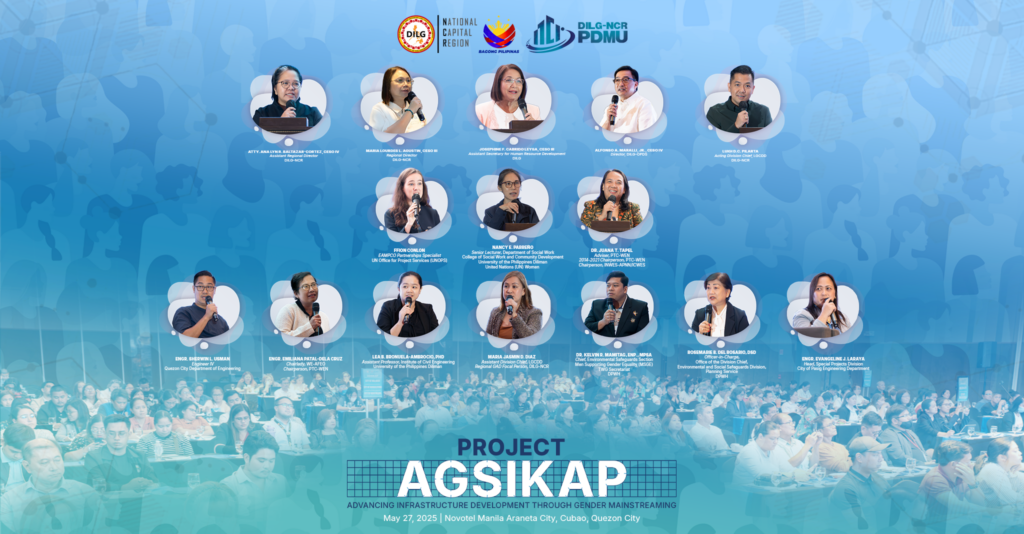
More than 200 representatives from local government units (LGUs) and experts from various organizations convened for the inaugural session of Project AGSIKAP, with the theme “Advancing Infrastructure Development through Gender Mainstreaming,” held on May 27, 2025, at Novotel Manila Araneta City, Cubao, Quezon City.
Spearheaded by the Project Development and Management Unit (PDMU) of the Department of the Interior and Local Government – National Capital Region (DILG-NCR), the session served as a platform to enhance the capacity of NCR LGUs to integrate gender-responsive approaches into infrastructure development.
DILG-NCR Regional Director Maria Lourdes L. Agustin, CESO III formally commenced the session with a welcome message, urging LGUs to redefine their project management capabilities and move beyond the conventional landscape to develop gender-inclusive infrastructure.
“Project AGSIKAP will serve as a renewed platform to reinforce the call for gender responsiveness in our infrastructure and programs—from conceptualization up to the implementation phase,” RD Agustin added.
This was followed by a message of support from DILG Office of Project Development Services (OPDS) Director Alfonso A. Maralli, Jr., CESO IV, who highlighted stories of transformation made possible by resilient and inclusive spaces for women and other vulnerable sectors. He encouraged participants to continuously learn, reflect, adopt best practices, and challenge the status quo in order to better meet their constituents’ needs.
DILG Assistant Secretary for Human Resource Development Josephine F. Cabrido Leysa, CESO III also delivered a message as the event’s guest of honor, emphasizing the importance of designing projects that are responsive to the needs of women and recognizing that development must be inclusive and shared by all.
Outlining the session’s objectives, DILG-NCR Local Government Capability Development Division (LGCDD) Acting Chief Luigi D.C. Pilarta described Project AGSIKAP 2025 as a testament to the Department’s ongoing efforts to provide a platform that ignites meaningful conversations—bringing global concepts into the local context.
The first part of the program featured presentations on advancing gender equality through inclusive infrastructure development, facilitated by United Nations (UN) Women National Consultant Nancy E. Parreño and Philippine Technological Council – Women Engineers’ Network (PTC-WEN) Adviser Engr. Juana T. Tapel, PhD.
Building on the insights shared, a panel discussion on the topic, “Rethinking Spaces: Why Infrastructure Must Work for Everyone,” was moderated by Ar. Michaela Rosette M. Santos-Tayag of the United Architects of the Philippines. Joining UN Women National Consultant Parreño as panelists were Engr. Emiliana Patal-Dela Cruz of PTC-WEN; Dr. Lea B. Bronuela-Ambrocio of the University of the Philippines Diliman – Institute of Civil Engineering; Dr. Kelvin R. Mamitag, EnP., MPSA and Dr. Rosemarie B. del Rosario of the Department of Public Works and Highways (DPWH); and Maria Jasmin D. Diaz of DILG-NCR.
Subsequently, Ffion Conlon, Partnerships Specialist at the South East Asia and Pacific Multi Country Office (EAPMCO) of the UN Office for Project Services (UNOPS), discussed the importance of integrating gender perspectives across all phases of infrastructure projects.
The program continued with another panel discussion focusing on strategies for implementing gender-responsive projects, which featured contributions from Engr. Evangeline J. Laraya and Engr. Sherwin L. Usman of the Engineering Departments of the City of Pasig and Quezon City, respectively.
To cap off the session, DILG-NCR Assistant Regional Director Atty. Ana Lyn R. Baltazar-Cortez, CESO IV stressed the critical role of public servants in addressing gender inequality. She also urged LGUs to continue advancing the event’s mission of expanding the discourse on gender mainstreaming within local governance.Project AGSIKAP is a reinvented capacity-building platform designed to support LGUs in navigating the evolving landscape of governance and infrastructure development.
Through its inaugural session, DILG-NCR set the stage for a deeper appreciation and understanding of gender-responsive infrastructure planning—demonstrating its commitment to fostering the development of safe, inclusive, and sustainable infrastructure across the region.
